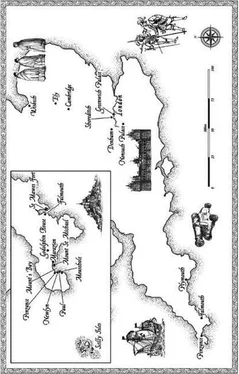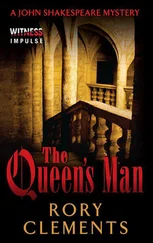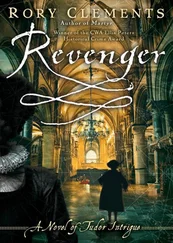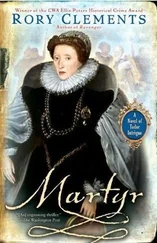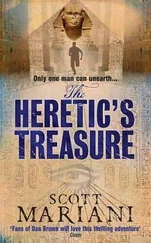Rory Clements - The Heretics
Здесь есть возможность читать онлайн «Rory Clements - The Heretics» весь текст электронной книги совершенно бесплатно (целиком полную версию без сокращений). В некоторых случаях можно слушать аудио, скачать через торрент в формате fb2 и присутствует краткое содержание. Год выпуска: 2013, Издательство: John Murray, Жанр: Исторический детектив, на английском языке. Описание произведения, (предисловие) а так же отзывы посетителей доступны на портале библиотеки ЛибКат.
- Название:The Heretics
- Автор:
- Издательство:John Murray
- Жанр:
- Год:2013
- ISBN:нет данных
- Рейтинг книги:3 / 5. Голосов: 1
-
Избранное:Добавить в избранное
- Отзывы:
-
Ваша оценка:
- 60
- 1
- 2
- 3
- 4
- 5
The Heretics: краткое содержание, описание и аннотация
Предлагаем к чтению аннотацию, описание, краткое содержание или предисловие (зависит от того, что написал сам автор книги «The Heretics»). Если вы не нашли необходимую информацию о книге — напишите в комментариях, мы постараемся отыскать её.
The Heretics — читать онлайн бесплатно полную книгу (весь текст) целиком
Ниже представлен текст книги, разбитый по страницам. Система сохранения места последней прочитанной страницы, позволяет с удобством читать онлайн бесплатно книгу «The Heretics», без необходимости каждый раз заново искать на чём Вы остановились. Поставьте закладку, и сможете в любой момент перейти на страницу, на которой закончили чтение.
Интервал:
Закладка:
Persons nodded. ‘Good. Which just leaves the matter of the traitor. He is in the hands of the Holy Office. I shudder to think that we ever trusted him. I fear he will burn in this world and the next.’
A lazy tic fluttered in the parchment-thin skin around Persons’s left eye. There was a softness about the priest, but he had a certain aura. His beard was short and neat, his eye clever and wary. He had an intimate manner that turned those he met into either devoted friends or dedicated enemies. Roag knew he was not given to squeamish women’s ways, nor subject to doubts in matters of faith. Yet he could see that the prospect of burning live human flesh disturbed him, as though the stench would remain in his nostrils, like bitter wormwood, for all eternity.
‘Men such as Warner make life difficult for us here,’ Persons continued. ‘And yet it were better it did not come to the fire.’
‘Then we must make do,’ Roag said evenly. ‘I will go to the Castillo de Triana from here. I am sure I will have a hearing.’
Joseph Creswell, Persons’ loyal assistant, sensed his superior’s discomfort. ‘Remember, Father, the holy doctor Thomas Aquinas himself concluded that execution by the secular authorities was the proper way to deal with heretics who refuse to be reconciled. First, excommunication from the Church and if, stubbornly, they refuse to recant, then by His law they should be excluded from life itself. The fire is God’s hand.’
Persons nodded, but without conviction.
There was silence in the room. From outside came the shouts of Spanish traders and the thump of drums.
‘Would you be a king, Mr Roag?’ Persons said suddenly.
‘Would you have me be a king?’
Father Persons smiled and folded his arms. ‘Come, I will hear your confession now, before you embark on your great enterprise.’
Roag did not move. ‘No, Father. I will confess when I return to you, for I know I must commit mortal sins in this holy war. I cannot yet cast off my coat of steel.’
‘Do not imperil your immortal soul, Mr Roag.’
‘No, Father.’
Creswell watched from a first-floor window as Roag untethered his horse and trotted eastwards towards the fish market and the bridge over the Guadalquivir. ‘He is cold and mad,’ he said, half to himself, half to Robert Persons who sat at the table behind him. ‘He has no religion, only resentment.’
‘He will carry out the task we wish, in the way we desire it.’
‘Will he? Can we trust him that much?’
‘Have faith, Joseph, have faith. After all, it is said he is the son of a king.’
‘And do you truly believe he has royal blood in his veins?’
Persons shrugged his shoulders but did not reply.
Chapter 8
Regis Roag gazed up at the Castillo de Triana. The stone walls were sand-coloured and warm, yet the overall impression was of dark foreboding. The fortress had been built on a massive scale to dominate the old Moorish town of Seville and to many people it was hell on earth, a huge cavern of pain and horror. Roag was not a sentimental man, but even he was struck by its grim power.
The castle stood on the western bank of the Guadalquivir river in the poorer quarter, where the old mariners and prostitutes, the manumitted slaves and beggars, scraped a living. It was the first sight of Seville to greet ships navigating up the olive-green waters of the river and it never failed to cast a gloom over the mariners’ mood. For a hundred and fourteen years now, the building had served as the prison of the city’s Inquisition. Countless men and women — mostly Jews, Moors and Lutherans, but also Catholics — had been brought here, accused of heresy and other crimes. Thousands had been tortured and hundreds had been handed over to the civil authorities — relaxed to the secular arm , as they called it piously — to be burnt at the stake. Those who repented, the fortunate ones, would be strangled by garrotte before the fire was lit.
Roag glanced back across the river to the fish market and, a little further south, to the splendid Torre del Oro. The tower of gold shimmered with warmth in the evening light, amid a tangle of shipyard masts and rigging. Turning back to the Castillo de Triana, the contrast was palpable. He entered through a great arch, next to the pontoon bridge, then dismounted and led his horse on foot. Roag was well known here and faced only peremptory questions from the guard. Striding across the outer courtyard, he passed a queue of black-clad and cowled men and women. He knew, from their furtive glances and the hiding of their faces, why they were there: they were informers, come to denounce enemies, neighbours, mothers or brothers, for gain or spite.
‘She is a fornicator,’ one would say in a shameless whisper; ‘I have heard him lauding the Luther sect,’ another would rasp, venom in her voice; ‘I saw her place a crucifix on the ground, then spread her skirts, squat down and piss on it,’ a scorned suitor would say, ‘what is worse, she is a Jew.’ And so those accused would be hauled before the Inquisitor, while the accusers slunk back into the shadows.
The malice here, amid the immense walls and embattled turrets, was almost tangible.
Roag was recognised by the gatekeeper, who showed him where to tether his horse, then admitted him through the heavy iron door. The would-be informers surged forward, but the gatekeeper pushed them back at the point of a pike and told them to wait for the prosecutor or his secretary. They were in Carmona with the Inquisitor-General, he said with a sneer. He did not know whether they would be here this week or the next. If the informers didn’t want to wait, they could take their chances with the civil authorities and have their testimony passed on to the assessors.
Roag had enough Spanish to ask to be taken to the gaoler, a magistrate named Enrique Jorge whose serious face betrayed no laughter lines; it did not do to laugh. One woman had found herself incarcerated simply for smiling when the name of the Virgin Mary was mentioned during a sermon. The witness who denounced her called the smile a sonrisita — a smirk.
But though he dared not smile, Enrique Jorge was a likeable, well-fed man who clearly enjoyed his mutton, bread and wine. He also enjoyed Roag’s company.
‘It is pleasant to see you again, Senor Roag,’ Jorge said. ‘But it always surprises me when you come here. I know of no other man who enters these walls unpaid and of his own volition.’
Roag bowed his head. ‘I am here to see Mr Warner. If you would take me to him, Senor Jorge, I would be happy to make a donation of gold to the Holy Office.’
Enrique Jorge shook his head and refused the money. ‘That will not be necessary. First drink a little chocolatl with me, then we will go to Warner. He is chained and has the mordaza about his face, for he is like a brute beast without it, cursing the Inquisitor, the Jesuit college and even you. He uses words that no Christian could repeat.’
Roag and the keeper drank their exquisite beverage, sweetened with sugar and spiced with vanilla, then walked through the echoing halls of the prison.
Enrique Jorge threw open the door to the cell. Roag gazed in with distaste. It was cold, gloomy and damp. Water streamed down the walls and settled in puddles.
Warner, the only prisoner, lay curled on his mattress, a clamp across his mouth. His hands were manacled in front of him, and he was chained to the wall.
Roag turned to the gaoler. ‘Would you remove the mordaza for me, senor. I must speak with the prisoner.’
‘I cannot do that, Mr Roag, for it has been ordered by Don Juan de Saavedra, the Chief Constable of the Inquisition. We require tranquillity within these walls and Mr Warner has been a disturbance to the peace.’
Читать дальшеИнтервал:
Закладка:
Похожие книги на «The Heretics»
Представляем Вашему вниманию похожие книги на «The Heretics» списком для выбора. Мы отобрали схожую по названию и смыслу литературу в надежде предоставить читателям больше вариантов отыскать новые, интересные, ещё непрочитанные произведения.
Обсуждение, отзывы о книге «The Heretics» и просто собственные мнения читателей. Оставьте ваши комментарии, напишите, что Вы думаете о произведении, его смысле или главных героях. Укажите что конкретно понравилось, а что нет, и почему Вы так считаете.
